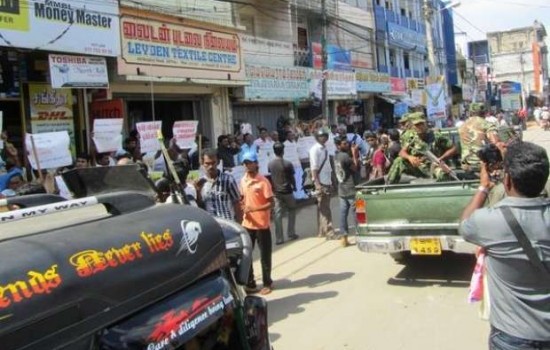Deal with the past constructively
Potential to inflame
The events surrounding the attempts by students of Jaffna University to commemorate those
who died in the war, unless speedily corrected, has the potential to inflame ethnic tensions and obstruct the post war reconciliation process. The students were lighting lamps on November27, the date formerly commemorated by the LTTE as their Heroes Day. This was broken up by the security forces who also arrested some of the students.
Polarize
The manner in which the security forces handled the situation has added to bitterness and distress within the affected Tamil community. Even journalists who were covering the incident were assaulted. This will serve to polarize Sri Lankan society and undo the constructive efforts to rebuild the war-affected community and inter-ethnic harmony that the government and civil society have the duty to consider as foremost national priorities.
Right to remember the dead
The National Peace Council believes that all people have a right to commemorate their war dead, even as the government does. This was a part of Sri Lanka’s own ancient tradition, exemplified in the historical account of the respect shown by the victorious King Dutugemunu to the tomb of the fallen King Elara. During the American civil war, the fallen soldiers of the confederate army were buried in the same military cemeteries as the fallen soldiers of the union army.
Commemorate ALL who died in war
One of the recommendations of the Lessons Learned and Reconciliation Commission appointed by the President was to commemorate all who died in the war. This recommendation, together with many others, is still to be implemented. These include the accounting for the large numbers of missing persons whom their families can never forget. The National Peace Council urges the government to speed up the implementation of the LLRC recommendations, especially those specifically pertaining to national reconciliation so that memories will be healed and national unity gained.
Enable Tamil people
We also believe that only the spirit of democratic freedoms, accompanied by constructive development of the economy that the government is emphasizing, will enable the Tamil people to come to grips with the destruction and suffering caused to them by the violent actions of the LTTE, including their holding of human shields in the last phase of the war.
Governing Council
The National Peace Council is an independent and non partisan organization that works towards a negotiated political solution to the ethnic conflict in Sri Lanka. It has a vision of a peaceful and prosperous Sri Lanka in which the freedom, human rights and democratic rights of all the communities are respected. The policy of the National Peace Council is determined by its Governing Council of 20 members who are drawn from diverse walks of life and belong to all the main ethnic and religious communities in the country.

